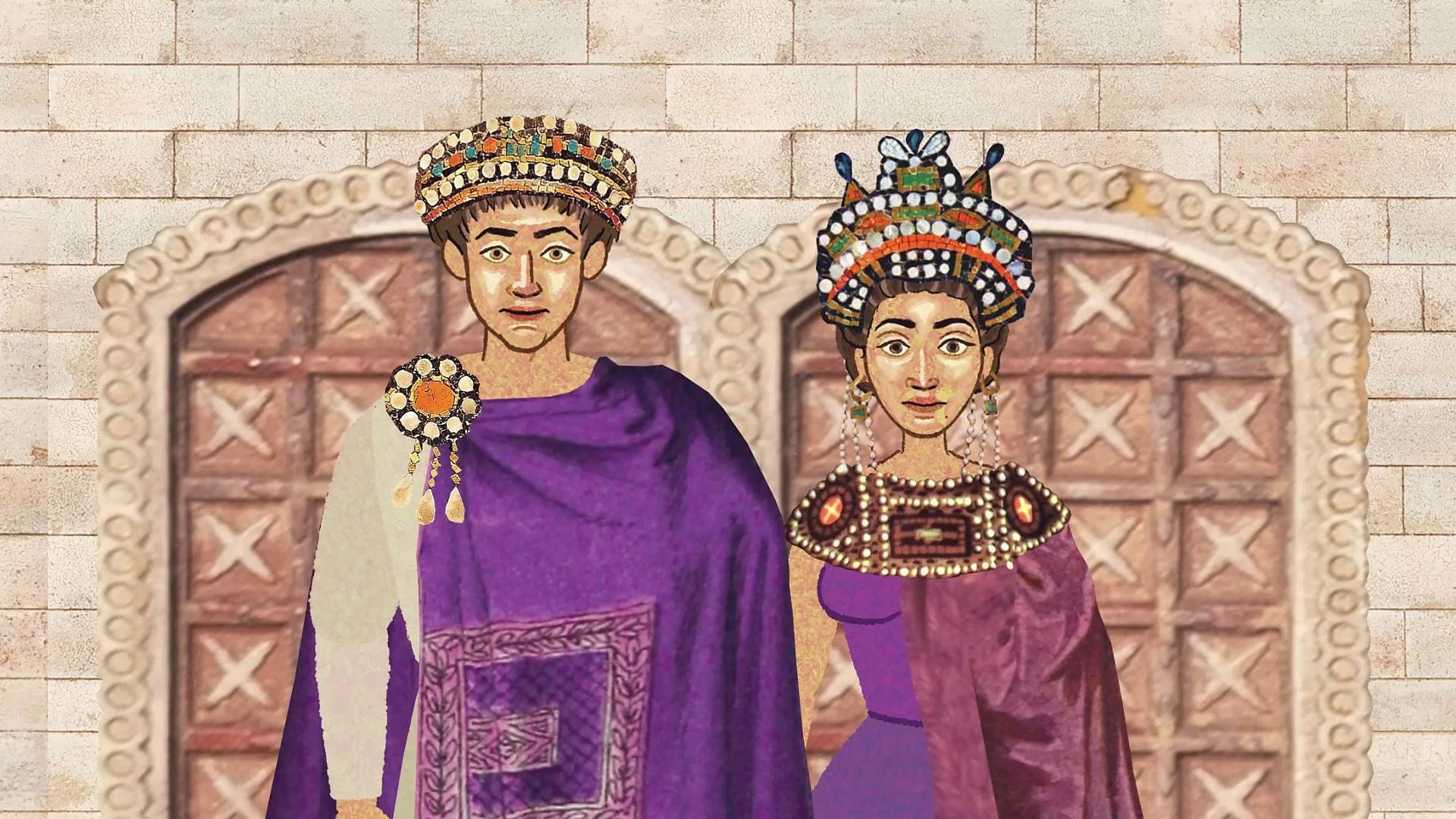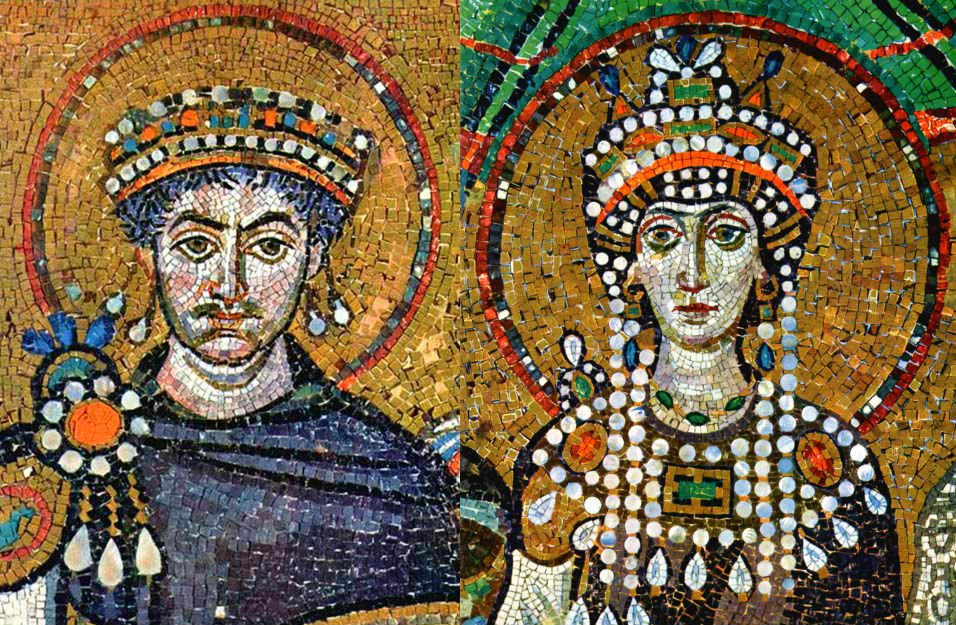The story of Justinian and Theodora, the power couple of the Byzantine Empire, is one of intrigue, bravery, and political genius. Their influence and impact on the empire during their reign is nothing short of remarkable.
Justinian, often referred to as the last Roman Emperor, sought to restore the glory of the Roman Empire while navigating the complexities of an ever-changing world. Theodora, his wife and empress, was a woman of exceptional intelligence and strength, who not only supported Justinian in his endeavors, but also played a crucial role in shaping policies and advocating for the rights of women. Together, they formed a formidable partnership, defying expectations and leaving an indelible mark on Byzantine history.
Discover the remarkable story of Justinian and Theodora, the power couple that shaped the Byzantine Empire. Justinian was an ambitious and visionary emperor, while Theodora was a strong and influential empress. Together, they implemented significant political, religious, and cultural reforms that left an indelible mark on Byzantine history. Their partnership was characterized by mutual support and shared goals, making them a formidable force. Learn more about the fascinating reign of Justinian and Theodora and their enduring legacy.

Contents
The Rise of Justinian and Theodora
Justinian and Theodora were a power couple who ruled over the Byzantine Empire during the 6th century. Their story is one of ambition, intellect, and resilience, as they faced numerous challenges while leaving a lasting impact on the empire and its history.
The Early Life of Justinian and Theodora
Justinian was born in 482 AD in Tauresium, a small village located in present-day North Macedonia. He was born into a peasant family but showed exceptional intellect from a young age. His uncle, Emperor Justin I, noticed his talents and brought him to Constantinople, where he received an education and eventually rose through the ranks to become Emperor himself.
Theodora, on the other hand, had a more tumultuous upbringing. Born in 500 AD in Constantinople, she grew up in poverty and faced hardships. She started her career as an actress and dancer, which was considered scandalous at the time. However, she caught the attention of Justinian, who fell deeply in love with her and fought to change the law that prohibited intermarriage between the aristocracy and performers. They finally married in 525 AD and became true partners in ruling the empire.
Justinian’s Achievements as Emperor
As Emperor, Justinian had a transformative impact on the Byzantine Empire. His most notable achievement was the codification of Roman law. He commissioned a group of legal experts to create the Corpus Juris Civilis, a comprehensive collection of laws that became the foundation of the Western legal system. This monumental work ensured the preservation and dissemination of Roman law for centuries to come.
Justinian is also known for his ambitious building projects. He ordered the construction of the Hagia Sophia, one of the most iconic buildings in the world. This architectural wonder became the largest cathedral in the world for nearly a thousand years and showcases the grandeur and opulence of the Byzantine Empire. Justinian’s reign also saw the construction of numerous fortifications, aqueducts, and public buildings across the empire.
Furthermore, Justinian pursued military campaigns to reclaim lost territories of the Western Roman Empire. His general, Belisarius, successfully reconquered parts of Italy and North Africa, bringing them back under Byzantine rule. These military victories expanded the empire’s influence and strengthened its position as a major power in the Mediterranean region.
Theodora’s Influence as Empress
Theodora proved to be an influential and powerful empress alongside Justinian. Despite her controversial background, she became known for her intelligence, political acumen, and advocacy for women’s rights. She played a significant role in Justinian’s decisions and policies, often advising him on matters of state.
Theodora was passionate about social justice and worked to improve the lives of marginalized groups, especially women. She passed laws to protect women from forced prostitution and provided support for former prostitutes to reintegrate into society. Theodora was also a staunch defender of Monophysitism, a Christian theological doctrine, and supported its inclusion in the empire, even against opposition from the Orthodox Church.
Additionally, Theodora showed great courage and leadership during the Nika Riots in 532 AD. While Justinian was considering fleeing the city, it was Theodora who convinced him to stay and face the rebellion head-on. Her resolute stance saved the empire and secured their reign.
Legacy and Impact
The reign of Justinian and Theodora left a lasting impact on the Byzantine Empire and beyond. Their rule marked a period of cultural and legal revival, with Justinian’s codification of Roman law serving as a significant contribution to legal history. The construction of architectural wonders like the Hagia Sophia showcased the empire’s grandeur and remains an architectural marvel to this day.
Moreover, Justinian and Theodora’s legacy extended beyond their reign. The Corpus Juris Civilis influenced the development of legal systems in Western Europe and served as a foundation for modern legal principles. Their pursuit of reclaiming lost territories brought parts of the Western Roman Empire back under Byzantine control, shaping the geopolitical landscape of the Mediterranean region.
Furthermore, Theodora’s advocacy for women’s rights and empowerment set a precedent for future rulers and contributed to changing societal attitudes towards women. Her support of Monophysitism also had a lasting impact on the religious landscape of the empire.
Justinian and Theodora: The Power Couple of the Byzantine Empire, will forever be remembered for their remarkable achievements, intellectual pursuits, and the enduring legacy they left behind.

Justinian and Theodora: The Power Couple of the Byzantine Empire
Justinian and Theodora were the epitome of a power couple in the Byzantine Empire. Justinian, who reigned from 527 to 565, and Theodora, his wife and co-ruler, exerted immense influence over the empire during their reign. They navigated complex political challenges, implemented ambitious reforms, and left a lasting impact on Byzantine society.
As Emperor, Justinian undertook numerous achievements, such as expanding the empire’s territory, codifying Roman law into the Justinian Code, and overseeing the construction of the Hagia Sophia. However, it was the partnership with Theodora that truly set them apart. Theodora was known for her intelligence, charisma, and strong character. She played a pivotal role in shaping Justinian’s policies, influencing his decisions, and championing the rights of women and societal outcasts.
Together, Justinian and Theodora faced challenges, including the Nika Riots, which threatened their rule. They stood united, quelled the rebellion, and solidified their reign. Their partnership showcased the importance of collaboration and shared leadership, making them a power couple for the ages.
Key Takeaways: Justinian and Theodora: The Power Couple of the Byzantine Empire
- Justinian and Theodora were the rulers of the Byzantine Empire in the 6th century.
- They were a powerful couple who made significant contributions to the Empire.
- Justinian was known for his military victories and for codifying Roman law.
- Theodora was a strong and influential empress who championed women’s rights.
- Together, they transformed the Byzantine Empire through their reforms and achievements.
Frequently Asked Questions
Here, we have answered the most common questions about Justinian and Theodora, the power couple of the Byzantine Empire.
1. Who were Justinian and Theodora?
Justinian and Theodora were a remarkable couple who ruled the Byzantine Empire from 527 to 565. Justinian was the Emperor of the Byzantine Empire, while Theodora was his wife and Empress. They are often regarded as one of the most influential and powerful couples in Byzantine history.
Justinian is known for his efforts to restore the Roman Empire to its former glory and bring stability to the Byzantine Empire. Theodora, on the other hand, played a significant role in political decision-making and social reforms. Together, they left a lasting impact on the Byzantine Empire and its culture.
2. What were their major accomplishments?
Justinian and Theodora’s rule was marked by numerous significant accomplishments, both in terms of political and cultural achievements. Here are some of their major accomplishments:
1. Hagia Sophia: Justinian and Theodora commissioned the construction of the Hagia Sophia, a grand cathedral in Constantinople (modern-day Istanbul). It was renowned for its architectural beauty and served as a symbol of Byzantine grandeur.
2. Legal Reforms: Justinian enacted significant legal reforms through the creation of the Justinian Code, which became the basis for Byzantine and European law. These reforms aimed to increase legal consistency and protect the rights of individuals.
3. Social Reforms: Theodora was a champion for women’s rights and played a crucial role in improving the status of women in Byzantine society. She worked to abolish forced prostitution and provide social support for women in need.
4. Expansion of the Byzantine Empire: Under Justinian’s leadership, the Byzantine Empire experienced significant territorial expansion, reclaiming many lost territories in the western Mediterranean and the Balkans.
3. How did Justinian and Theodora impact Byzantine culture?
Justinian and Theodora had a profound influence on Byzantine culture. Here are some of the ways they impacted Byzantine culture:
1. Art and Architecture: Justinian and Theodora sponsored the construction of numerous architectural marvels, including the Hagia Sophia and several other churches, palaces, and fortifications. Their patronage of the arts and architecture left an indelible mark on Byzantine culture.
2. Legal and Political System: Justinian’s legal reforms, codified in the Justinian Code, introduced important principles into Byzantine law that influenced legal systems in Byzantium and Europe for centuries to come.
3. Theater and Performing Arts: Theodora herself was a former actress and was known for her support of the theater. She encouraged the performing arts, contributing to the cultural richness of the Byzantine Empire.
4. What challenges did Justinian and Theodora face during their reign?
Justinian and Theodora faced several challenges during their rule. Some of the key challenges included:
1. Nika Riots: In 532, the Nika Riots erupted in Constantinople, posing a serious threat to Justinian’s rule. The riots were a result of popular discontent and political rivalries, but through decisive action, Justinian and Theodora were able to quell the uprising.
2. Political Intrigues: The Byzantine court was rife with political intrigue and power struggles. Justinian and Theodora had to navigate these complexities to maintain their authority and implement their reforms.
3. External Threats: The Byzantine Empire faced numerous external threats, including invasions from barbarian tribes and conflicts with neighboring empires. Justinian and Theodora had to protect the empire’s borders and defend its territories.
Justinian and Theodora: The Byzantine power couple – BBC REEL
Justinian and Theodora were a remarkable power couple who played a significant role in shaping the Byzantine Empire. They were not only partners in marriage but also partners in ruling and governance.
Justinian was a visionary emperor who implemented numerous legal, military, and architectural reforms, while Theodora was a highly influential empress who championed women’s rights and stood up for the oppressed. Together, they transformed the Byzantine Empire into a vibrant and prosperous civilization.
Justinian’s legal reforms, such as the codification of Roman law in the Corpus Juris Civilis, provided a strong foundation for the empire’s legal system and influenced legal systems throughout Europe. His military campaigns aimed to restore the empire’s former glory and recover lost territories.
Theodora, with her intelligence and strong personality, was an invaluable ally to Justinian. She actively participated in political decision-making and advocated for the rights of women and the lower classes. One of her most notable achievements was her role in ending the Nika riots, where she fearlessly stood her ground and convinced Justinian not to flee the city.
This power couple’s legacy is not only marked by their political achievements but also by their patronage of magnificent buildings like the Hagia Sophia. Justinian and Theodora’s reign was characterized by their determination to leave a lasting legacy of greatness, intellectual advances, and cultural preservation.